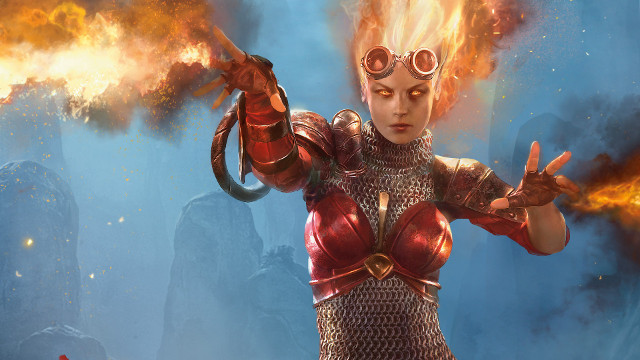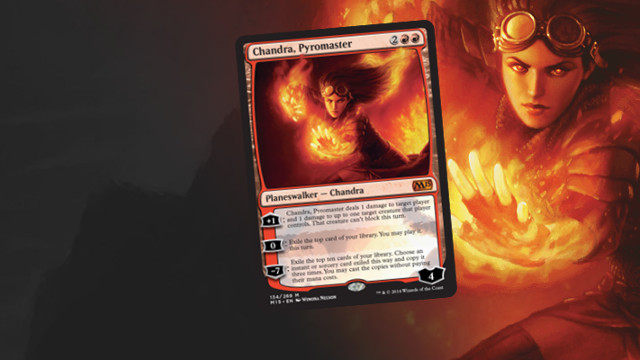The Magic: The Gathering developers have been accused of “queerbaiting” following a recent conclusion to a romantic storyline featuring an LGBTQ+ planeswalker named Chandra. What’s more, Wizards of the Coast has apologized about the way it has handled this storyline, but the apology post is reportedly banned in multiple countries that generally have less favorable opinions about the LGBTQ+ community.
Let’s start from the beginning: a “planeswalker” is a character in Magic: The Gathering who casts spells and travels across the multiple different planes in the game’s universe. Players, too, are considered planeswalkers, but the game also features several named characters in the wider lore. Most (if not all) of these NPC planeswalkers are represented in playable cards that can be used in the game, either as regular creatures or as special planeswalker cards.
ALSO: Why YouTube COPPA rules are worrying for content creators
One of these planeswalkers is a woman named Chandra, a powerful spellcaster who wields fire magic. She also happens to be bisexual, but a recent storyline featuring her ended on a rather sour note as highlighted in this tweet:
Casually lighting on fire a decades' worth of work connecting to your diverse fanbase. pic.twitter.com/nln2PzxV95
— April King (@CubeApril) November 12, 2019
As this storyline had been going on for years and was coming to a head, fans were understandably upset at the conclusion and a portion of them accused Wizards of the Coast of “queerbaiting” as noted in this comprehensive thread on ResetEra. If you’re unfamiliar with the term, here is the definition of it from the English language Wikipedia article on the subject:
Queerbaiting is a marketing technique for fiction and entertainment in which creators hint at, but then not actually depict, same-sex romance. They do so to attract (“bait”) a queer audience with the suggestion of relationships that appeal to them, while at the same time attempting to avoid alienating other consumers.
The backlash was apparently so severe that it led Wizards of the Coast to issue an apology to Magic: The Gathering fans about the way that the plotline was resolving. Wizards of the Coast subsequently promised that “Chandra will love and be involved with many characters as her story unfolds—regardless of gender.”
Although Wizards of the Coast apologized, it appears that they’ve made yet another misstep, as the actual apology post is reportedly unavailable in several countries that are less than friendly (or outright hostile) to the LGBTQ+ community as noted in this submission to the /r/magicTCG subreddit.
A search of the Magic: The Gathering apology post on GeoPeeker, a website that allows you to view a web page from multiple different countries, shows that the apology shows up just fine in the following locations:
- Brazil
- Virginia, United States
- California, United States
- Ireland
- Australia
However, the apology does not show up in Singapore, a country with several anti-LGBTQ+ laws on the books and where pretty much every facet of LGBTQ+ relationships (save for same-sex relationships between women) is banned. Instead, the web page viewed via a Singaporean IP address simply states “This content is not available.”
I also ran a search at GeoScreenshot featuring a few hand-selected countries along with some random ones thrown in, the results of which you can see below:
Locations where the Magic: The Gathering apology post is visible
- Cairo, Egypt
- Hong Kong
- Jerusalem, Israel
- Kupayansk, Ukraine
- Lahore, Pakistan
- Luxembourg
- Phnom Penh, Cambodia
- Qaraghandy, Kazakhstan
- Riyadh, Saudia Arabia
- Seoul, South Korea
- Tampa, United States
- Tokyo, Japan
- Varna, Bulgaria
- Vilnius, Lithuania
Locations where the Magic: The Gathering apology post is hidden or blocked
- Dagupan, Philippines
- Dubai, United Arab Emirates
- Jakarta, Indonesia
- Moscow, Russia
- Pasay City, Philippines
- Shanghai, China (outright blocked)
Some people in the Reddit submission and elsewhere are speculating that the apology post was removed in a selection of countries so as not to offend the cultural sensibilities of those people and damage their brand in that region.
However, others point out that the apology post itself may actually be illegal in some nations. For example, the Russian “gay propaganda law” — officially known in English as the “for the Purpose of Protecting Children from Information Advocating for a Denial of Traditional Family Values” federal law — could potentially make Wizards of the Coast liable for any content that is seen as promoting an LGBTQ+ agenda. Video games have been previously affected by this law, with The Sims 4 being rated as for adults only in the country.
It’s clear that Wizards of the Coast has made several missteps with this recent Magic: The Gathering story. While it has apologized, the selective availability of the apology post in certain countries raises questions about its commitment to LGBTQ+ rights and representation.














